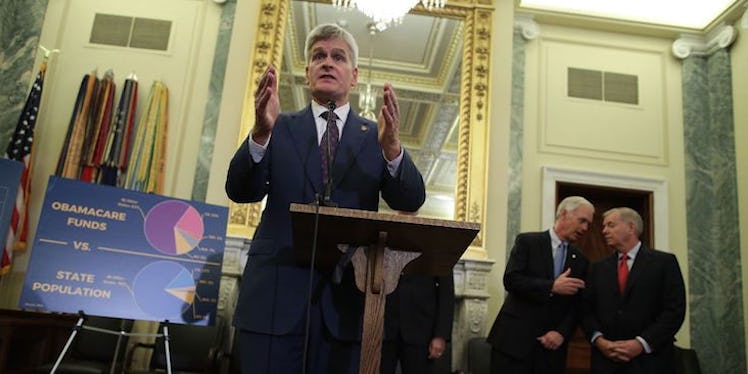
The GOP's Newest Obamacare Repeal Plan Would Cost Billions Of Dollars
The GOP is rallying to secure the votes needed to pass their latest attempt to repeal the Affordable Care Act (ACA, aka Obamacare). But while the Congressional Budget Office hasn't yet given a report on the financial impacts of the bill, a study by nonpartisan consulting firm Avalere models the potential cost of the Graham-Cassidy healthcare bill, and it doesn't look good. The health care bill would cost states $215 billion dollars in funding collectively over the next ten years, and up to $4 trillion over 2o years.
This latest attempt to repeal Obamacare by the Republican party would change or eliminate a host of items that the Affordable Care Act provided, as Politico reports. Notably, Medicaid expansion would be axed, as would tax credits and subsidies that help offset the cost of medical payments for low-income individuals. Employers would no longer be fined for failure to provide affordable healthcare. And states would be given carte blanche to use their funding as they like.
Medicaid -- and its beneficiaries -- would suffer. A lot.
Under the new bill, Medicaid expansion, an Obamacare provision that led to more people getting subsidized coverage in 31 states plus D.C., would be axed.
Both red and blue states would be affected, but some states would suffer under the bill. States that haven't been as aggressive or effective in signing their constituents up for Medicaid, for example, would be given a boost starting in 2021 over states that saw higher enrollment, the Center on Budget and Policy Priorities writes.
The bill also imposes a per capita cap on Medicaid, which would place a fixed amount of spending on healthcare for beneficiaries, rather than apportion the funding based on a state's actual needs. Compared with current law, 20 states would see a massive hit of between 35 and 60 percent to their funding, according to CPBB.
In a statement regarding the new healthcare proposal, Avalere's Senior Vice President Caroline Pearson says,
The Graham-Cassidy bill would significantly reduce funding to states over the long term, particularly for states that have already expanded Medicaid. States would have broad flexibility to shape their markets but would have less funding to subsidize coverage for low- and middle-income individuals.
The effect on children, the elderly and those with disabilities could be devastating. (See the nosediving linear graphs below.)
The block grant system leaves spending up to the states.
The new bill also creates a block grant system, whereby states receive a lump sum of funding rather than apportioned amounts. This means states can spend the money however they see fit. Though Republican have touted this as allowing flexibility and experimentation, progressive groups caution that it would cause millions to lose their coverage because the block grant doesn't keep pace with current funding -- allocating $239 billion less from 2020 to 2026, CPBB reports.
Note: the bill only accounts for block grant funding through 2026. After that? Funding would need to be reappropriated, and there's no guarantee states will get the funding they need.
Though some states would make gains in the present, in the long haul, cuts could be dire. Over the next 20 years, according to Avalere, all states would see a massive cut in funding if the Graham-Cassidy bill goes through compared to current law. By 2036, cuts would range from $4 billion in South Dakota to (gulp) $800 billion in California.
The bill is meeting opposition from both sides, and time is running out.
The bill faces rejection across the aisle. Senator Rand Paul (R-KY) has spoken out against the bill, and it is expected that his colleague Susan Collins (R-ME) will join him in voting no. Despite the bipartisan opposition, President Donald Trump is standing by it.
The race is tight for securing the needed votes to pass the Senate. With 50 votes needed to pass and 52 Republican senators, the bill can't afford more than two defections. (Vice President Mike Pence can serve as a tiebreaker.)
Right now, all eyes are on Senators John McCain (R-AZ) and Lisa Murkowski (R-AK) as to whether they'll vote no. The GOP is trying to get the bill pushed through by the Sept. 30 deadline, when the threshold for the simple majority vote expires. After that, the bill will need 60 votes to pass the Senate, an unlikelihood given the widespread Democratic opposition to it.
In the meantime, Republicans have also been facing backlash over their own responses to and positions on the healthcare bill.
CNN's running tally shows that a number of Republican senators are still undecided on the bill. Besides securing the votes, Vox reports, there are other hurdles yet to be passed before the bill makes any forward movement, and as of now, there is not date set for the vote.